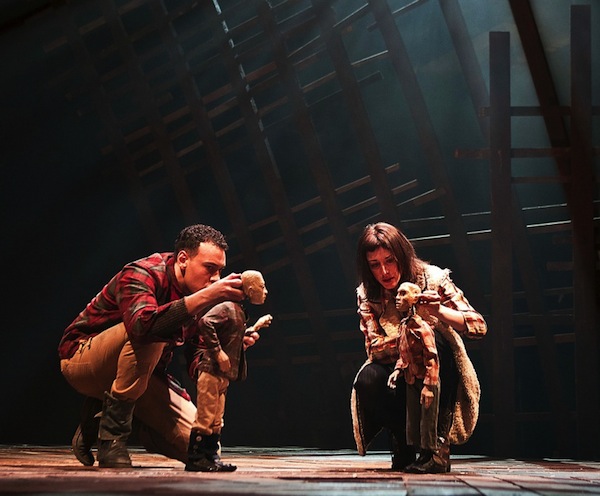Theater Review: “A Midsummer Night’s Dream” — Too Much Clutter, Too Little Poetry
All the prancing about onstage with planks of wood, actors climbing into eight-foot large puppet skeletons, is marvelous to behold, but it makes for an uneven, confusing production.
A Midsummer Night’s Dream, by William Shakespeare. A Bristol Old Vic production, with the Handspring Puppet Company. Directed by Tom Morris. Presented by ArtsEmerson at the Cutler Majestic Theatre, Boston, MA, through March 15.
By Robert Israel
The secret to the pleasures audiences derive from Shakespeare’s A Midsummer’s Night’s Dream, some 400-years after it was first performed, lies in the sparkling clear genius of the play’s poetic language. Props, costumes, and other clever stage effects – depending on how they are used or abused — may either enhance or obstruct our experience of words whose enduring power is to mesmerize, to enchant, and to entertain.
The Bristol Old Vic players – a ragtag troupe of thespians from the U.K. who worship and toil at the House of Shakespeare – may be more than qualified than most to deliver these words with aplomb. But here they are hampered, hobbled, distracted, and finally undone by the very props created by the ace Handspring puppeteers. What is meant to delight turns out to obstruct.
All the prancing about onstage with planks of wood, actors climbing into eight-foot large puppet skeletons, is marvelous to behold, but it makes for an uneven, confusing production. The actors cannot be both industrious elves in the marionette workshop while also delivering scintillating lines that should enlarge our imaginations on their own.
There are moments when the visually powerful stagecraft and poetry come together, and then the audience is treated to a rich conspiracy of talent, color, and craft. Unfortunately, these interludes of fusion come most consistently after the intermission, when the players rise to the challenge and manipulate their puppet shapes with a casual panache. It’s as if they’ve regained strength after the intermission. Before that, many, if not most, of the cast of 12, who play multiple roles, display visible signs of exhaustion after pumping so much enthusiasm into fueling the ornate machinery of illusion.
The key to Shakespeare’s Midsummer’s Night’s Dream, can be found in a play the Bard wrote 16 years later, The Tempest. A mysterious half-human creature, or “mooncalf,” named Caliban (who reminds me of Puck in Dream) dramatizes the surreal complexities of the human spirit, how our lives teeter between reality and dreams. At one point, Caliban describes hearing marvelous sounds, that “in dreaming /The clouds methought would open and show riches/Ready to drop upon me that/when I waked/I cried to dream again.”
In Midsummer’s Night’s Dream, Puck shares with us his knowledge of the world of spells, reveries, dreams and awakenings. Characters become intoxicated, stupefied. They cry out to dream or to awaken from strange comminglings, only to demand the dream-state again. This is a dimension in which an ordinary laborer morphs into a donkey. This is a universe where lovers who lead perfectly sensible lives look upon the first image before them and become blinded with the frivolities and carnalities of love. The language, not the props, is the thing that stimulates the imagination.
In the Bristol Old Vic production, the character Puck is neither fish nor fowl, neither spite nor human. He is a hand puppet composed of items found in a trash bin – an oil can, with spatulas for wings and clumpy wooden blocks for legs. Not one but three actors manipulate him, sometimes on the stage floor, other times holding him aloft. They are usually too busy in their ministrations to do proper service to Shakespeare’s poetry — while the performers recite Puck’s lines they make whooshing sounds in unison, inaudibly sighing as he takes to the air. It is a lost opportunity. This Puck does not seduce our imaginations the way Caliban’s description beguiles our minds and transports us into euphoria. The Bristol Old Vic troupe and the Handspring Puppet Company production is too weighted down with clutter to move us that far.
Robert Israel writes about theater, travel and the arts, and is a member of Independent Reviewers of New England (IRNE). He can be reached at risrael_97@yahoo.com

